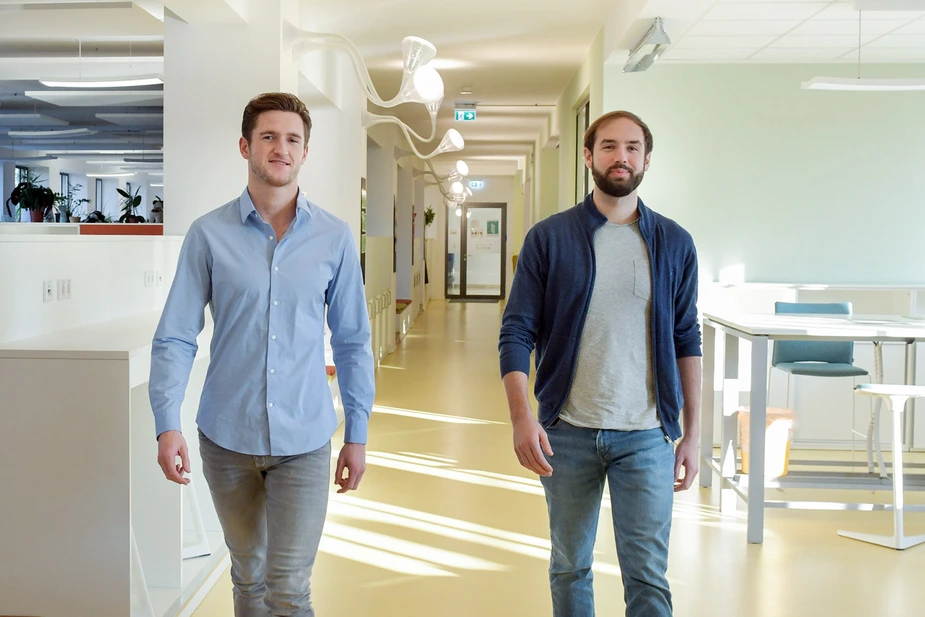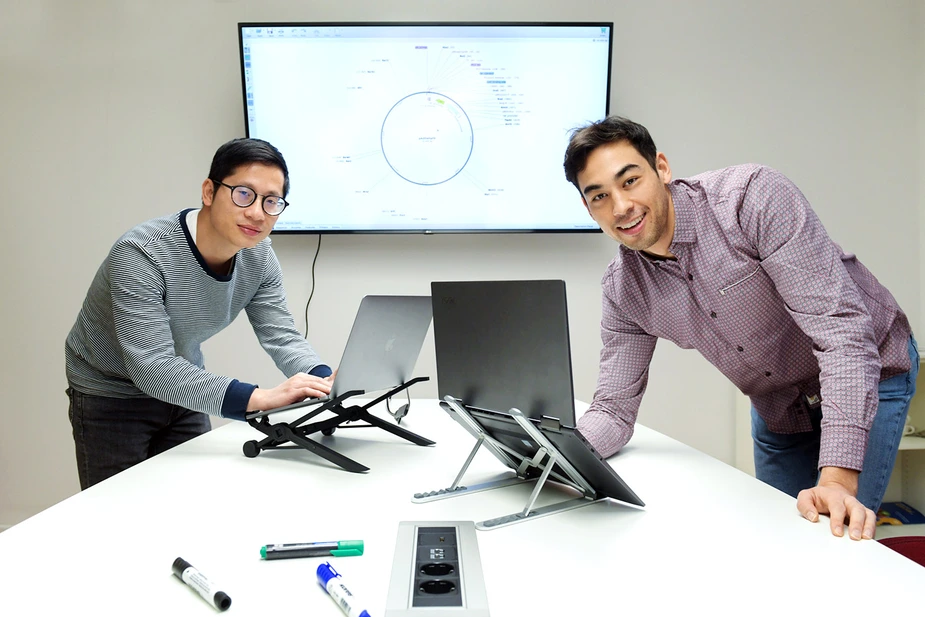A bold start – despite COVID-19
What drives prospective business founders – two teams from the Adlershof Founder’s Lab report
Making the step to start a company requires courage, even when things are normal. What drives prospective founders to take the step during the epidemic year 2020? – two teams from the Adlershof Founder’s Lab report
It’s early 2020. After the first reports from Wuhan, the coronavirus pandemic still seemed fairly opaque to Florian Berg and Julius Wiesenhütter, like a mirage in the desert of Oman, which they were crossing in a jeep at the time. The two friends from university spoke about their life, job satisfaction, and goals. After earning their business degrees, they went through stints at start-ups and consulting agencies. It wasn’t exactly fulfilling. They felt like building something up themselves.
One possible approach was this: They both realised talking to people they knew that it was a problem to find reliable care for relatives. “Back in Germany, we spoke to caregiving companies and facilities and to analyse the reasons for their problems,” says Berg. Their findings: Due to the lack of skilled workers, they are often unable to compensate for absences. Simultaneously, the state of being overburdened and a complex bureaucracy prevented companies from recruiting skilled workers abroad. This although so many young people worldwide were desperately looking for a career perspective. The two friends decided to build bridges between those worlds. Despite the coronavirus, they quit their secure jobs and started planning their start-up Fachkraft1.
“We bring together companies and institutions from sectors that experience a lack of skilled workers with skilled workers and trainees from countries with a surplus of skilled labour,” says Wiesenhütter. Fackraft1 has developed a software-driven process to this end. “Service as a software,” says the company claim. The two founders are building an international network of educational institutions enabling employers to specifically ask for certain applicants and to meet them in online meetings. If the chemistry is right, they go through a multi-stage qualification process that includes professional knowledge, language, and culture. At the same time, the founders help jobseekers take care of the paperwork according to the Skilled Immigration Act and find a place to live in Germany. “The new law enables us to standardise the process for a variety of sectors,” says Berg.
Travel restrictions are currently obstructing the establishment of their contact and service platform. Thanks to online meetings, however, their network is growing anyway. After all, the lack of skilled workers is a more long-term problem than COVID-19. This is helped along by a growing willingness on all sides to use online communication and engage in digital processes. Team Cinference reports similar things. Like Fachkraft1, they were founded as part of the Adlershof Founder’s Lab, where they benefit from mentoring, coaching, workshops, and a one-year fellowship of 2,000 euro per month per person. Cinference founder Christian Wirsching sees the pre-seed programme as “the ideal basis for developing our business idea and to add definition to something based on market resonance.”
Together with his co-founder Cuong To Tu, he is working on making deep learning methods useable for protein engineering. The two are what recruiters call high potentials: Educated at top-level universities in Aachen, London, and Beijing, stints at McKinsey, at the IBM development lab in Zurich, a Fraunhofer Institute, as well as other research institutions in Dublin and Berlin. As an engineer, Cuong has been specialising on machine learning for 15 years. He got to know Wirsching at the Entrepreneur First programme, which brings together individuals bent on starting up companies.
Their initial plan was a technology platform for the financial sector. Talking to potential customers, however, made them rethink. They are now applying the prototype of their platform to proteins. More specifically: Protein engineering through targeted combination of amino acids for application in personalised medicine, biotech, pharmaceutical and materials research. “We have learned from users in these fields that the use of machine learning in labs is still in its infancy, despite there being a broad data foundation for systematic analyses from high-throughput screening,” explains Wirsching.
The complexity is overwhelming. Variances at the atomic level can determine a protein’s function in certain disease patterns. Finding the right combination of amino acids is like finding a needle in the haystack. With their software, the founders aim at using deep learning to seek out new and promising combinations in data from scientists and drug developers – and to learn to forecast proteine function. Moving into the Adlershof Founder’s Lab was a conscious decision. The local clusters, the high concentration of research institutions, and tangible start-up support convinced them. Despite all the planning, there was no way of forecasting that a virus would ravage the world at this very moment. But that didn’t stop them. “My impression is that partners and researchers are even more accessible at the moment. Meeting them online instead of travelling also takes some strain of our tight budget,” says Wirsching.
By Peter Trechow for Adlershof Journal

